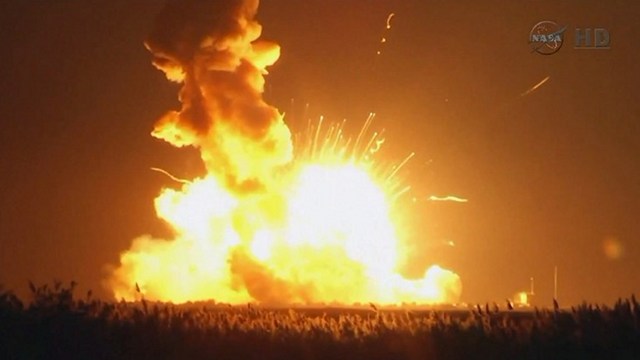SUMMARY
This is AI generated summarization, which may have errors. For context, always refer to the full article.
- ‘Pick your cross’: Remembering Yolanda’s victims
As millions of Filipinos troop to cemeteries across the country, many in Tacloban will only have a mass grave to go to, as the government has yet to finish identifying the victims of Super Typhoon Yolanda. Around 1,000 temporary crosses serve as temporary markers where the families of the victims can light their candles, offer flowers, and pray. Relatives now have to pick and label random crosses in the mass grave – “first come, first served.” It could take up to two more years before the relatives will finally have a permanent place to honor their loved ones, according to the National Bureau of Investigation.
Learn more about this story, and about the Yolanda victims’ memorial wall to be unveiled on the anniversary of the disaster, on Rappler. - Accidents put in question future of spaceflight

The week saw two major setbacks in space flight: First, the explosion of the unmanned Antares rocket, and then the crash of the Virgin Galactic spaceplane. The Antares rocket, owned by private firm Orbital Sciences and under contract with NASA, was supposed to bring supplies to the International Space Station, but instead it exploded just seconds after liftoff October 28. Then, on October 31, Virgin Galactic’s SpaceShipTwo – planned to be a spacecraft for space tourism – crashed during a test flight, killing one of its two pilots. Investigations are ongoing, and we may soon know what really happened. The incidents deal a huge blow to both programs, costing billions of dollars and setting back research and development by a few years in the case of civilian spaceflight.
Read more about the two incidents on Rappler. Forbes looks into doubts that now cloud the US’s commercial launch strategy. Meanwhile, the BBC asks: Will the SpaceShipTwo crash set back space tourism? - The month that changed Hong Kong
It started with a pre-dawn declaration: As protest to China’s plan to meddle in the upcoming 2017 elections, pro-democracy leader Benny Tai announced a civil disobedience campaign. Crowds – mostly students – gathered at the Admiralty district of the city, where the territory’s government held office, and from there, the massive rallies took off. It has then been labeled other names: Occupy Hong Kong, the Umbrella Revolution. One month on, the protests continue. The South China Morning Post notes, it has gone far beyond what the planners have envisioned, and it has plunged the city into its worst political crisis. Hong Kong’s citizens have been deeply divided, and the tensions have escalated. The question now remains: What’s next for Hong Kong?
Read more on the South China Morning Post. The SCMP also has this story of an Occupy protester’s sacrifices. - Pope and evolution: Nothing new to see here
A mini-frenzy erupted early this week, after Pope Francis addressed the Pontifical Academy of Sciences in the Vatican. In a speech he delivered at the institution October 27, he said that the theory of evolution and the concept of the Big Bang isn’t contradicting Catholic beliefs. Many took it as something revolutionary, another of Pope Francis’ forward-thinking new ideas; but in reality, the notion that creationism and evolution can go side-by-side isn’t new to the Roman Catholic community. It is, what a biologist tells Newsweek, merely “echoing” what Francis’ predecessors viewed, on the “importance of respecting the independence and integrity of scientific inquiry.” The Atlantic, on the other hand, says the big fuss is just Western media “perpetuating the faith-versus-science binary,” and takes away from the real issues the Church needs to face.
Read more on Newsweek and The Atlantic. - Life and times in Korea’s Demilitarized Zone
It’s the world’s most heavily fortified border, dividing two countries technically still at war, for more than 6 decades now. Welcome to the Demilitarized Zone, or DMZ, where North and South Korean soldiers warily stare at each other every day, mines dot the land, with only the village of Panmunjom sitting in the middle. The DMZ is home mostly to the soldiers guarding both sides of the border, and a small contingent of soldiers from neutral countries basically observing the fragile peace. Al Jazeera takes a tour of the area – from the South, of course – and tells the story of the 10-member strong Neutral Nations Supervisory Commission, or NNSC, tasked with helping maintain the calm in this otherwise dangerous and tension-filled region.
Here’s the story of how they hang out in the DMZ, on Al Jazeera. - France’s wines’ hot problem

In the hills and valleys of France’s wine regions, vintners are slowly feeling the heat of climate change. As the world continues to experience dramatic changes in the climate, extreme weather is taking its toll on the country’s legendary vineyards, with cold, cold winters, heavy rains, and hot summers, in place of the consistently warm climes these places experience. It is threatening thousands of years’ worth of tradition and heritage in winemaking – and it is felt not just in France, but also in Italy, Spain, and other places in Southern Europe. But the wine makers aren’t just sitting down – they are fighting to save the world’s legendary wines from simply evaporating from the face of the planet.
Read more about the vineyards’ fight for survival in Der Spiegel. - Why the 2014 US midterm polls matter
Will the Democrats lose control of the US Senate? If analysts are correct, they will, come November 4, when millions of voters from sea to shining sea go to the polling booths (or have already done so days before) and choose their next lawmakers, and even local officials. With a damaged image – no thanks to an unpopular Barack Obama, a dismal economy, many other factors – Democrats are poised to become the minority party in Congress, and the Republicans will take control of both Senate and House. This does not bode well for Obama, as he tries to get things done, with around two years left in his term. Whatever happens on Election Day, the United States will most probably remain deeply divided along party lines – and nervous about their future.
Read The Guardian’s briefing about this complex topic. - Facebook’s Saverin: Timing essential to success
Speaking at the Forbes Global CEO Conference at a panel on disruptive innovations in Singapore, Facebook co-founder Eduardo Saverin said innovation has changed over the years, but he was at the “right place, at the right time” when he and Mark Zuckerberg thought of Facebook. He said timing is essential to success. “[If I were still at Harvard] I would end up, just as before, an entrepreneur,” he said. “Success is about being at the right place at the right time. I’ll never take credit for what happens but I’ll go along for the ride.” Today, innovation is starkly different from what it used to be, Saverin said, as he shared 3 observations on how innovation has changed since Facebook was first conceived.
Read the full story on Rappler. - Ali vs Foreman: Legacy of a historic fight
Forty years ago this week, 100,000 people packed the Tata Raphael stadium in Kinshasa, Zaire (now DR Congo), to watch the historic “Rumble in the Jungle” – one of modern history’s biggest and most important sporting events. Two boxing greats faced off on October 30, 1974: Muhammad Ali, who was fighting his way back to the top after a ban; and George Foreman, then the defending world campion. Forty years after the 8th round knockout of Foreman by Ali, the stadium that witnessed the historic event is dilapidated – but the city’s pride in hosting the epic “Rumble” remains.
Read more about the recollection of Kinshasa’s residents, in this story from the Agence France-Presse, on Rappler. And where are they now? Read more about the post-Rumble lives of Ali and Foreman, also on Rappler. - The Pinoy foodie’s guide to Christmas drinks
It’s that time of the year again, when coffee shops and tea houses reveal their holiday-themed beverages. As Christmas nears, popular coffee chains such as Starbucks, Coffee Bean and Tea Leaf, and even tea shops such as Serenitea and Chatime launch some popular old-time favorites and new drinks to perk up customers after that long shopping trip, or when catching up with friends and family visiting for the holidays.
Read about some of tea and coffee drinkers’ options this holiday season, in Rappler’s Life & Style section.
Add a comment
How does this make you feel?
There are no comments yet. Add your comment to start the conversation.